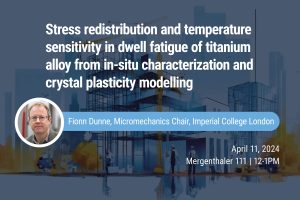
Fionn Dunne, Micromechanics Chair at Imperial College London will give a talk titled “Stress redistribution and temperature sensitivity in dwell fatigue of titanium alloy from in-situ characterization and crystal plasticity modelling.”
Abstract
Cold dwell fatigue in Titanium aero-engine alloys is the degradation and failure process in which microcracks, or facets, nucleate typically within 15o of basal planes of (hard) HCP grains orientated with their c-axes at or about parallel to principal stress direction. A key driving force has been argued, through use of crystal plasticity (CP) modelling methods, to be creep deformation in an adjacent (soft) grain well-orientated for slip leading to stress redistribution onto the hard grain which occurs during cycle hold times (the dwell period), and over progressive cycling. In addition, dwell facet nucleation and growth has been found to be associated with macrozones (or ‘MTRs’) which are millimeter-sized polycrystal regions with strong texture. So far as we are aware, the key mechanistic argument for soft-grain creep and load shedding onto an adjacent hard grain have not yet been demonstrated or measured in experiment. Similarly, the effect of temperature on dwell fatigue sensitivity has relied on CP modelling which suggests peak load shedding occurs at about 120oC but which largely diminishes away at about 220oC, but this also has yet to be demonstrated by experiment. The work presented in addresses these important absences.
About Our Speaker
Professor Fionn Dunne researches micromechanics of microstructure-level deformation and the mechanistic drivers of fatigue crack nucleation and growth, including Titanium cold dwell fatigue. A particular focus is bringing together quantitative characterisation (DIC and EBSD) with computational discrete dislocation and crystal plasticity. He previously served as RAEng/Rolls-Royce Research Chair, Rolls-Royce Nuclear University Technology Centre Director, and in the Ministry of Defence’s Research Programmes Group. He is currently on Max Planck Institute’s International Scientific Advisory Board. He led the HexMat EPSRC programme grant (£5m) and is partner on the USAF MAI Dwell Programme. He was elected Fellow of the UK’s Royal Academy of Engineering in 2010 and awarded the Institute of Materials, Minerals and Mining’s Harvey Flower Prize 2016.